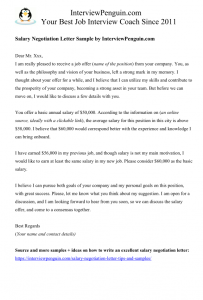You got a job offer. A great position. Actually, you have always dreamed of this particular job, and you made a great effort to prepare for your interview in the company–an effort that has eventually paid off. You did great. They are impressed. Everything seems perfect, but one thing is missing : The salary offer is not that great. It is worse than you expected. Actually it is quite horrible…
What should you do in this case? Should you simply reject their offer? Or should you try to negotiate a better salary, writing a letter after the interview? But how to write such a letter? To whom should you address it? And how to make sure that it won’t close your doors to the company forever? I will try to answer the questions in this article.
* Do not forget to check also: Salary counter offer tips.
Main parts on an excellent letter
Let’s have a look at three principal parts that should not be missing on your letter.
First part: Praise and pleasantries
In the beginning of your writing you should thank the employer for offering you a job. You should emphasize how happy you are to get the chance to work for their company. Such a simple introduction can look like the following paragraph:
Dear Mr. Xxx,
I am really pleased to receive a job offer of (name of the position) from your company. Your corporate values and goals, as well as your personal skills and experience, left a strong impression in my memory. I thought about your offer for quite a while, and believe that I would utilize my skills and contribute to the prosperity of your company, becoming an asset for your team. But before we can move on, I would like to discuss a few details of the offer.
Second part: Say what you want to change, and give them a good reason to change it
Do not waste waste many lines with pleasantries. At the end of the day, they know that you do not write them just to say thank you, or tell them how great they are…
Come to the point. Mention the things you would like to change, and try to give them a good reason for considering your suggestions.
You offer a basic annual salary of $50,000. According to the information on (an online source, ideally with a clickable link), the average salary for this position in this city is above $58,000. I believe that $60,000 would correspond better with the experience and knowledge I can bring onboard.
I have earned $56,000 in my previous job, and though salary is not my main motivation, I would like to earn at least the same salary in my new job. Please consider $60,000 as the basic salary.
Special Tip: Download a great sample letter in one page long PDF, and use it as your reference anytime when you’d negotiate your starting salary:

Third part: Confirming your interest and closing the letter
At the end of your letter, it is important to leave the door open for further negotiation–give them a chance to respond. Tell the employer that you are open for discussion, that your letter is not a yes-no proposition. Stress your intentions to deal with the problem quickly, so you can start working for them and help them prosper.
I believe I can help you pursue your company goals with great success. Please, let me know what you think about my suggestion. I am open for a discussion, and I am looking forward to hear from you soon, so we can discuss the salary offer, and come to a consensus together.
Best Regards
(Your name and contact details)
* May also interest you: 7 sample answers to “What is your desired salary?” interview question.
Address the letter to the right recipient … and wait
Do not forget to address the letter to the right person – the manager who gave you an initial offer, or the person who led the interview with you (typically this will be the same person, but if one of them is higher in the hierarchy of the company–a decision makes–you should address your letter to them).
Then you should wait for their response. Be patient. Wait at least for a couple of days. If they really want to hire you, they will come back, with a better offer… And if they do not come back, give them a call, or try your chances in another job interview…
Continue your preparation with Interview Penguin:
- Salary negotiation tips – Basic rules you should remember when negotiating a salary in your interview (or afterwards)
- Interview questions and answers – Great answers to 15 most common interview questions, such as what motivates you, why should we hire you, what are your strengths, etc.
- How to negotiate salary over the phone – Simple and practical guide that will help you get the most out of your opportunity.
- 2 weeks after interview and no response – what does it mean?

